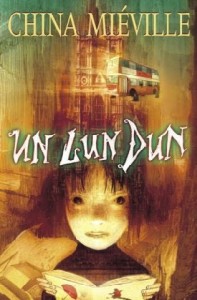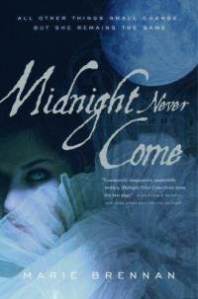Urban Undergrounds
Today’s list falls into a bit of an obscure category, but it’s one that I’ve been drawn to over and over again. The four books below aren’t necessarily “urban fantasy” in the prevalent sense of fantasy set in the real world, but they are inescapably urban. These stories involve cities with dark and intensely magical alter-egos–underground mirrors that become characters in and of themselves.
1. Neverwhere – Neil Gaiman
 I adore Neil Gaiman. His American Gods is my favorite book in the world, insofar as I’m remotely capable of choosing a favorite book. Among his books, Neverwhere runs a close second. Originally a BBC miniseries (that I have yet to track down), the book follows the adventures of kind-hearted protagonist Richard Mayhew and a girl named Door.
I adore Neil Gaiman. His American Gods is my favorite book in the world, insofar as I’m remotely capable of choosing a favorite book. Among his books, Neverwhere runs a close second. Originally a BBC miniseries (that I have yet to track down), the book follows the adventures of kind-hearted protagonist Richard Mayhew and a girl named Door.
The urban environment in question is London, and its mirror is London Below, a shabby, grimy, and magically inventive city below the city. Richard originally travels to London Below in an effort to save the supernatural Door from a pair of thuggish assassins. When he tries to return to life as usual, he can’t: no one can see him in the world above, his apartment is rented out to someone else, and he certainly can’t go back to his job.
Which is a good thing for us, because it drives him back underground, where he meets up with the enigmatic and coat-wearing Marquis de Carabas, along with Door and a famed warrior/bodyguard named Hunter. Our adventuring party conducts quite the exploration of London Below along the way to their goal. Possibly my favorite elements are the Floating Market, a magical bazaar that occupies a hidden section of Harrods; and the angel Islington, of Islington, London, who’s been assigned as protector of London Below following his botched job of protecting Atlantis. Yes, that Atlantis.
Basically, read this. It’s wonderful.
2. The City & the City – China Miéville
 The titular cities in this award-decorated novel aren’t actually from the real world, but they seem like they could be–if you tilt your head and squint sideways. Here’s why: the twin cities of Beszel and Ul Qoma occupy the same geographical space, but a mix of law and the supernaturally threatening enforcers called Breach keeps them distinct. Parts of the cities are “total,” belonging entirely to one city–but parts are “crosshatched,” areas shared by both, and through which citizens walk alongside one another while carefully and deliberately not seeing their alternate-city counterparts. (In the novel, these cities do exist in our world–and tourists’ momentary lapses of perception can result in immediate deportation.)
The titular cities in this award-decorated novel aren’t actually from the real world, but they seem like they could be–if you tilt your head and squint sideways. Here’s why: the twin cities of Beszel and Ul Qoma occupy the same geographical space, but a mix of law and the supernaturally threatening enforcers called Breach keeps them distinct. Parts of the cities are “total,” belonging entirely to one city–but parts are “crosshatched,” areas shared by both, and through which citizens walk alongside one another while carefully and deliberately not seeing their alternate-city counterparts. (In the novel, these cities do exist in our world–and tourists’ momentary lapses of perception can result in immediate deportation.)
It sounds horribly confusing and gimmicky. Under the guiding hand of Miéville’s superlative world-building skill, though, it becomes something else entirely. The City & the City is a great introduction to Miéville’s work: not a doorstop like many of his other books, it melds speculative fiction and detective novel into a beautifully understated commentary on our world’s urban citizens and bureaucracies. We are very good at ignoring what is very real and right in front of us. Miéville’s novel reminds us of that while striking just the right strange, eerie tone.
3. Un Lun Dun – China Miéville
 I wanted not to include two China Miéville books in this list. But Un Lun Dun is technically YA, and Miéville writing for a young-adult audience barely seems like the same person as Miéville writing for adults. He’s nailed an entirely different voice in Un Lun Dun. So deal with it; he’s awesome.
I wanted not to include two China Miéville books in this list. But Un Lun Dun is technically YA, and Miéville writing for a young-adult audience barely seems like the same person as Miéville writing for adults. He’s nailed an entirely different voice in Un Lun Dun. So deal with it; he’s awesome.
Un Lun Dun follows twelve-year-old friends Zanna and Deeba on their adventure into “UnLondon.” I absolutely adore this take on an alternate London. More whimsical and certainly more colorful than Gaiman’s vision in Neverwhere, UnLondon is made up of broken and thrown-out elements from London itself: broken umbrellas, discarded clothing, and a villainous pollution-monster called the Smog.
There are plenty of light-hearted and easily legible puns in this book, which, for a childhood fan of things like The Phantom Tollbooth and a current-day fan of things like Salman Rushdie’s Haroun and the Sea of Stories, reads as quintessentially YA for me. Alongside the titular “Un Lun Dun” are a Chosen-One “Shwazzy” for “choisi” (literally French for “chosen”) and a mysterious London “magic” called the Klinneract, a mistranscription of “Clean Air Act,” a real-world-London weapon against the Smog.
The overall combination still carries the typical Miéville allegory, but it’s so imaginative and fun that it avoids preachiness. Also, one of the passageways between London and UnLondon is a giant ladder of bookshelves. Need I say more?
4. Midnight Never Come – Marie Brennan
 Regular readers of this blog may remember that Midnight Never Come wasn’t absolutely my cup of tea when I reviewed it. But the Onyx Hall itself–the faerie court in which a good fraction of the book takes place–was one of my favorite parts.
Regular readers of this blog may remember that Midnight Never Come wasn’t absolutely my cup of tea when I reviewed it. But the Onyx Hall itself–the faerie court in which a good fraction of the book takes place–was one of my favorite parts.
Midnight Never Come posits a dark and labyrinthine faerie court beneath Elizabethan London. Brennan has to be credited with creating a relatively authentic fey mirror to a historical city, and not just the present-day London that writers like Gaiman and Miéville capture so well.
The Onyx Hall is anchored to London above by a magical cornerstone to the city, the “London stone,” whose presence becomes important later in the plot. Moreover, faerie queen Invidiana is an intriguing mirror to mortal queen Elizabeth, who makes a couple of appearances herself. The book even accounts for Edmund Spenser’s 16th-century epic poem “The Faerie Queene” as an interpretation of Invidiana and Elizabeth’s troubled relationship.
Did I miss any of your favorites? Let me know so I can read them! (Especially if you know of one featuring my new hometown, New York–I couldn’t think of any!)

Have you thought about looking into any of the Percy Jackson books? They are super YA, but my roommate had to read some of them for a class, and she says they’re actually quite enjoyable. I bring it up because it’s based around a New York City that has somehow become the new Olympus for the Greek pantheon, which is pretty fun. I guess it’s not an alternate city in the way that these books are, but it’s the first thing that came to mind.
They weren’t actively on my list, but I’d heard good things. And since I refuse to grow up, I still love YA. :)
Mieville and Gaiman, two of my favorite fantasists!
Have you ever read any Charles deLint? he does a lot of mythology meets urban fantasy type stuff, and it’s really, really good.
Mine too, as you can probably tell!
I haven’t read any deLint! He’s one of those authors who’ve been on my radar for years, but have never made it to the top of my to-read pile. Any recommendations on where to start with his work?
I think my favorite DeLints are The Little Country and Someplace to be Flying, but nearly everything he’s written is wonderful. He usually involves some Native American mythology elements, or Celtic mythology.
Have you read “Palimpsest” by Catherynne M. Valente? It’s this fantastical city that people can only enter via sexual intercourse with a person who’s already been there, and once you enter, a tattoo appears on your skin that’s a map of the part of the city you were just visiting. To visit a new part, you have sex with another person who has that tattoo. The actual city itself is really creative, and the writing is gorgeous.
I hadn’t even heard of that one. Sounds intriguing, though. I’ll check it out!
I believe Neverwhere is available on Netflix, but no longer for streaming. It’s a pretty solid mini-series.
In a similar vein, I’d recommend the Underland Chronicles by Suzanne Collins. Very YA (my 12 year old is reading them now), but a lot of fun and very well written.
Yeah, I’m generally willing to expend the effort to find a TV series if it’s a BBC genre show… it tends to be worth it.
Thanks for the rec! Suzanne Collins is great. I’ll keep an eye out for those.